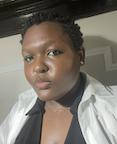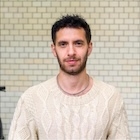Student Ambassadors
Speaking with a student ambassador is a great way to get a previous student’s perspective on the Language Schools experience.
If you would like to connect with a student ambassador to ask questions, please contact Tina Ilgner, German School Assistant Director, at germanschool@middlebury.edu.

Adrian Anaya
Hometown: Queretaro, Mexico
Program: 7-week Immersion
Level: 3
Current: Director of Marketing, Membranas Estructuradas
What surprised you about your experience at the Middlebury Language Schools?
I was surprised by the resilience shown by the students in levels 1 and 1.5. If it was hard for me in level 3, I simply cannot imagine what it must have been for them. Truly brave!
Why did you choose to study at the Middlebury Language Schools?
A close friend of mine who did the Spanish school recommended the program. She said it was a very very special time, regardless of which language you studied. I started to look into the German school, and I was sold by the commitment shown to language learning.
Please describe how your language skills improved due to your studies at Middlebury.
I have never learned more than I have at Middlebury. Unlike other peers who more casually studied German, I now have the confidence to speak with native speakers. I know that my German still isn’t perfect, but I have gotten past that initial language barrier.
What advice would you give someone wanting to attend the German School?
Middlebury will change your life. Your brain will always be working at 110% capacity, whether you’re eating, playing, and even sleeping. You will not only be learning a language at blitzschnell pace, but also forming some of the tightest friendships you have ever made. I will carry with me the people I met at Middlebury forever. Only attend if you’re prepared to have such meaningful connections.

Tunisia Artopé
Hometown: Brooklyn, NY
Program: 7-week Immersion
Level: 2
Current: Occupational Therapist
What surprised you about your experience at the German School?
I was most surprised by how much German I understood, from the start to the end of the program. Naturally, I was nervous about taking on such a big challenge. However, all professors and staff were patient, encouraging, and supportive. The professors knew how to communicate and share content with me, support my level of German language comprehension, and build confidence in my German language skills.
Why did you choose to study at the Middlebury Language Schools?
I chose to study at the Middlebury Language Schools because I believe that you must be immersed in a language to fully grasp it. Middlebury Language Schools’ reputation for language immersion stood out as one of the best. Additionally, an acquaintance of mine is a Middlebury Language School alum. Their language fluency and positive experience at Middlebury intrigued me and convinced me to take on this challenge.
Please describe how your language skills improved due to your studies at Middlebury. How are you currently using or planning to use the language you studied in your daily life (job, personal, research, etc.)?
My German language skills definitely improved during my time at Middlebury. In the past, I avoided lengthy conversations in German due to nervousness. At Middlebury, you take a pledge to use your target language for the program’s duration. Constant language exposure, expressing myself daily, and sharing the experience with others helped me push beyond my comfort zone with German. I now feel more comfortable having long conversations in German. I would love to use my new skills while traveling in Germany to surprise friends. Until then, I practice with a German friend, read German books I discovered at Middlebury, or journal in German.
What makes the German School a unique environment to learn the language?
The German School is a unique environment to learn the language because everyone is dedicated to the language pledge. Many of the professors and staff are native speakers, which provides you with the opportunity to train your ears to understand the German language as it is spoken in different regions. The program is designed to immerse you in the language. From classes to mealtimes in the cafeteria, club activities, and more. Additionally, Middlebury’s campus is beautiful, and you may often find yourself in awe of the lush green environment.
What advice would you give someone wanting to attend the German School?
Advice I would give to someone wanting to attend the German School is to be ready to work hard. This is not your native language. You will learn a great deal, and sometimes you will feel like your brain is at maximum capacity. Remember that you are not alone and lean on your professors, the staff, and your fellow classmates for support. Everyone wants you to succeed!
If you’ve had other language learning opportunities, how would you compare them to your experience at Middlebury?
I have had various other language learning opportunities, including online classes, language apps, and language exchange partners. All were great options, though I believe I made my greatest gains at Middlebury, and I would recommend it to further your target language skills.

Kimberly Barnhart
Hometown: Barnard, VT
Program: 7-week Immersion
Level: 1.5, 3
Current: Academic Dean and French Teacher, The Sharon Academy, Sharon, VT
What surprised you about your experience at the German School?
I was surprised by how quickly we learned and how much all the activities fed into that learning. For example, I frequently found myself hearing and using vocabulary and sentence structures from my grammar or literature course in my clubs and activities. I had known that full immersion would have a huge impact on how quickly I learned, but I had not realized what a domino effect it would be.
Why did you choose to study at the Middlebury Language Schools?
I had studied in the French school’s graduate program one summer years ago, but had not experienced the undergraduate levels. My son and I had been talking about how fun it would be to learn German together, so we decided to give it a try.
Please describe how your language skills improved due to your studies at Middlebury. How are you currently using or planning to use the language you studied in your daily life (job, personal, research, etc.)?
I’m so pleased that I am able to hold conversations in German. I’ve discovered that there are a lot of German speakers in my life, which I had not realized before. I’m talking to people regularly in German and am continuing my German studies independently in my daily life. I would like to get back to the German school next summer with the eventual goal of being able to offer German classes at the school where I currently teach.
What makes the German School a unique environment to learn the language?
Every aspect of your daily life is in the target language: classes, clubs, meals, movies, table tennis, everything! The professors eat with the students at mealtimes, and everyone is happily chattering away in German. By week two, even Level 1 students were holding their own at the dinner table. I was in Level 2, and by the end of the first week, I found I was even dreaming in German. The full immersion makes a huge difference to your progression.
What advice would you give someone wanting to attend the German School?
Throwing oneself into the Language Pledge® is a key component to learning at the German School. When you don’t know the exact way to say what you want to say, try to say it anyway. There are usually ways to talk around the topic to get at what you are trying to say. That struggle is part of the learning. Plus, everyone around you understands the struggle and will help!
If you’ve had other language learning opportunities, how would you compare them to your experience at Middlebury?
I think you learn more at Middlebury than you do trying to immerse yourself in the language in a European country, which I did in French. Middlebury was more of an immersion for me than studying in France. So many Europeans speak English that they often switch to English at the first sign you are struggling in their language, so you lose the advantage of muddling through.
Describe your typical day at Middlebury.
I would get up around 7 to have breakfast and review anything I needed for my classes. I had three classes between 9 am and 1 pm every weekday. After class, we had our lunchtime. The bilinguals would bring around the daily newsletter, which we would often read together and discuss. After lunch I did my homework for the next day, checking in with my professors at their office hours, if needed. If I finished early enough, I would hang out to watch soccer games or play table tennis in the living room of one of the dorms. Daily clubs started around 4 pm on most days, and I was engaged in a number of these. I joined the Theater Club, so as the summer progressed, much of my club involvement gave way to play rehearsals. (Theater club takes a LOT of time!) Dinner was around 7 pm. After dinner, I’d hang out with friends or walk into town. On the weekends, there were a variety of activities available, including movies, excursions to a local lake, a brunch discussion group, and so on.

Sébastien He
Hometown: Chengdu/Montreal
Program: 7-week Immersion
Level: 4
Current: Attorney
What surprised you about your experience at the German School?
Quite a few pleasant surprises! For example, many German School students and faculty members have musical talents. I’m a classically trained pianist, and I greatly enjoyed playing chamber music with them. Another surprise is how much I learned about the culture, literature, and history of German-speaking countries. Middlebury is not just a language school where students learn the language.
Why did you choose to study at the Middlebury Language Schools?
I had two main reasons. First, I wanted the full immersion experience without any exposure to English, and attending language programs in German-speaking countries could still expose me to English - as I experienced in other language programs abroad. Second, I looked for programs in which I could use the language instead of doing endless grammar drills. Middlebury easily and uniquely satisfied my two criteria.
Please describe how your language skills improved due to your studies at Middlebury. How are you currently using or planning to use the language you studied in your daily life (job, personal, research, etc.)?
My classes were reading- and writing intensive. We read a variety of literature including poetry, novels, news articles, and academic journals, and I had writing assignments almost everyday (with daily feedback from the teachers). Now I feel more comfortable reading German literature and expressing myself in written German. Thanks to the extracurricular activities and the meals I’ve shared with German School students and faculty members everyday, I am also more at ease speaking the language. Now I continue to read German literature and speak German with German-speaking friends - including those from the German School.
What makes the German School a unique environment to learn the language?
For me, it was the incredibly supportive and approachable faculty members who also engaged with students outside of classrooms. I received feedback almost everyday, and they were ready to help not only during regular office hours, but also anytime when I saw them on campus. They also led club meetings, played sports with students or, in my case, played chamber music together. Through these interactions with them, students can use what they learn in classrooms and improve language skills efficiently.
What advice would you give someone wanting to attend the German School?
One, be prepared to work really hard. The German School is very intensive, but you will benefit tremendously if you put in the effort and take advantage of all the resources. Two, participate in the extracurricular activities! There are a wide range of clubs - you will not be bored. I had no theater experience but decided to participate in the theater club; it was challenging yet incredibly fun and rewarding. I not only improved my German, but also made good friends.
If you’ve had other language learning opportunities, how would you compare them to your experience at Middlebury?
Because of the Language Pledge® and the extracurricular activities, Middlebury creates an immersive environment that language courses in countries where the target language is spoken could not replicate. In such language courses I have attended, many students would switch to English after classes ended. Moreover, I did not have enough opportunities to use the language. For example, workers in the service industry often switched to English, and there were no opportunities for me to easily have meals or participate in activities with native speakers. At Middlebury, my German improved greatly because the Language Pledge® ensured that I - and everyone else around me - used only German for the entire program.
Describe your typical day at Middlebury.
Typically, I would wake up around 8:20 and bike to my 9:00 class after a quick shower and a simple breakfast. From 9:00 to 13:00 we had three classes - Landeskunde, German Literature, and Advanced Grammar. After classes, I usually walked to the cafeteria with my roommates or other friends, and we would have lunch together with other German School students or teachers. My afternoons were usually dedicated to homework and theater rehearsals. After dinner, I often headed straight back to my room or the library to study - usually with my roommates, but I also had regular chamber music rehearsals with other musicians in the German School. It was not unusual for me to study past 2:00 in the morning. The German School is very intense, yes, but it was extremely fun and rewarding; I never felt exhausted!

Delicia Kamins
Hometown: San Francisco, California
Program: 7-week Immersion
Level: 1.5
Current: Stony Brook University, Philosophy
What surprised you about your experience at the Middlebury Language Schools?
How much Deutsche Schule became home. I really personally identified with all things Middlebury German School: the rhythm of the lesson plans; the activities, my professors (LOVED my professors - the best there are!!) and my fellow students. We were an actual little German Town in the midst of all of the other Middlebury Language “Towns” (French, Hebrew, etc.)! I think this was because there were such a variety of types of “extracurricular” German-language activities (movies, games, sports, field trips, drama, opera, chorus, and all of the clubs). Though these were not part of the class lesson, they were as important to learning the language because we were living the language. I loved it! I was also really surprised how much I enjoyed the location - absolutely beautiful, and the folks who live there year-round were so supportive of our Language Pledge and goals.
Why did you choose to study at the Middlebury Language Schools?
I study German philosophy, so I really need to learn the language to read the texts in the language in which it was written, as well as to be able to collaborate on projects with colleagues in Germany. However, my primary goal was to be able to become an expert in German philosophy so that I could share what I find so worthwhile about it with students who would otherwise not be exposed to philosophy, and particularly to German philosophy. As an African-American woman, I did not discover the brilliance of Kant, Hegel, Husserl, Heidegger and other German philosophers until I was an adult - but when I did, it changed my life, profoundly so in fact. I want to bring this to young students like I was so that they might choose to study these philosophers early in their lives - and perhaps thereby impact the world in profound ways. To do this to the extent I desire, and to well mentor future undergraduate and graduate students, I need to know the texts as close to the authors’ meanings as possible. That means learning German. Middlebury was highly recommended to me by a former Middlebury Summer Language Intensive student at my current university, and the idea was affirmed by my professors who advised me to apply to Middlebury over other language programs such as the Goethe Institute and even over spending the summer in Germany!
Please describe how your language skills improved due to your studies at Middlebury.
When I entered the program, I could count to ten. Learning was a lot of work - which is why the extracurricular activities in German helped so much. I had become used to hearing (but not understanding as these were advanced, and in some cases native, speakers) conversations in German, as I stammered my beginner level sentences. One day, I realized that I was following the high level conversations completely! I nearly screamed in surprise. For me, listening and reading comprehension is easier than speaking, so it took a bit longer to hold normal speed and complicated conversations, but it started happening. I think this surprised me so much because in the beginning basic expression took so much effort. But, that’s what Middlebury is known for: rapid and real development of a language. I really hope to return next year to continue my development. Since I left able to speak, listen and read in German, I can only imagine how fluent I will become a year from now! I am really appreciative that I am a Middle Summer Language School student!
What advice would you give someone wanting to attend the German School?
This is really one of the best investments you could ever make with your time and work. It is not often you experience such thorough success so quickly. It feels great! Plus, it’s fun - I wasn’t expecting it to be that much fun because I figured that to develop such fluency so rapidly would require 16 or 20 hours a day of study study study. Though you do need to put in the work, the real language and skill acquisition seems to emerge from living the language through activities, clubs and friendships. In my experience, if you need to learn a language, Middlebury is where you want to be.

Michelle Keefe
Hometown: Bear, DE
Program: 7-week Immersion
Level: 1
Current: PhD student in Medieval Studies, Yale University, focusing on early Christian art and architecture
What surprised you about your experience at the German School?
I came in as Stufe 1, with no prior German knowledge or experience. As someone who loves to talk, I had been so nervous to take a Language Pledge® and essentially lose all of my language. I imagined I’d end up being very quiet and very frustrated those first couple of days and weeks. I was genuinely surprised by how forcefully my impulse to communicate overrode my lack of language. I was acting, gesturing, making sounds, speaking around a concept using whatever words I was picking up, describing ideas, giving examples and analogies - all to try to communicate. It was such an incredible experience realizing that even without my usual arsenal of words, there are quite a lot of ways to communicate a concept or thought and to be understood. It was certainly frustrating, but it was also wonderfully rewarding to engage in the struggle. Before long, I was surprised by how quickly I was able to operate in the language, and was shocked every time I thought about how far I had come, given that just a few weeks prior, I had known no German at all!
I was also pleasantly surprised as the weeks went on, by how freeing it was to be in a place for seven weeks with no other objective, no other worries, and no other goal, except simply to learn German. This factor enabled me to be more present in my courses, in conversations with others, in activities or sports I was participating in, etc. I was more present day-to-day, and thus more rejuvenated by the program than I had ever imagined.
Why did you choose to study at the Middlebury Language Schools?
I have had prior experiences with full-immersion language programs, and I know without a doubt that it is the best way to learn a language. With language learning, whenever there is an “out,” many people, including myself, will often take it – it’s easier, more efficient, less taxing, etc. to switch to English, even if just for a brief couple of moments. Therefore, I knew that being in an immersive environment where there was no “out” was going to push me to engage deeply with the language and not rely on any crutches in order to communicate. I had heard that Middlebury was the best place to have this type of an immersive experience, and that the Middlebury system for learning languages works. It is 100% true.
Please describe how your language skills improved due to your studies at Middlebury. How are you currently using or planning to use the language you studied in your daily life (job, personal, research, etc.)?
My language skills in German improved exponentially. Coming in with no prior German, I was expecting nothing but improvement! Even so, I was blown away by how much I gained. I absorbed so much and was shocked at how quickly I was operating in the language, even though I couldn’t actually understand everything. Between morning coursework, mealtimes, and then all of the activities and events offered, it was an incredible environment to learn and practice the language in context right away.
My goal with German is to be able to confidently read academic and scholarly sources for my research. I am currently keeping up my German through regular meetings with a speaking-partner, in group events and bookclubs offered through the German Department at my school, by watching movies and listening to music in German, and also by reading small portions of whatever texts I can, whether it be academic articles or young adult books or comics.
What makes the German School a unique environment to learn the language?
The people at the German School are absolutely top-notch. I could not imagine doing what I did and being as successful as I was, without the incredible support, creativity, passion, and dedication from every single person there, especially the professors and staff members.
Furthermore, the German School is outstanding because of the breadth of activities, lectures, and events they offer for each person to continue implementing and practicing the language every day. There was always something going on, things to do, and activities to participate in. No matter the event or activity, the faculty and staff were always eager to help me keep practicing my German skills.
What advice would you give someone wanting to attend the German School?
I would say first, especially for anyone coming in at the beginner level, clear your calendar and let yourself have the gift of being fully present in the program. If you can, put everything else to the side for those 7 weeks - your other work especially. Being able to focus 100% on German and not have anything else hanging over my head each day let me truly immerse myself in whatever was going on in front of me. It was wonderful to not have anything else pressing me for time or taking my attention away from learning German.
I would encourage prospective students to also think about ways to take the language pledge as seriously as possible for themselves, - and to think about what music, movies, or level-appropriate books you might want to relax with at the end of a tiring day. One of the best pieces of advice for me just before taking the language pledge was “Youtube is your friend.” I started looking up every single musical score I know, and trying to find the music in German. That way, I was able to sing the German lyrics to songs I already knew and loved in English. But now, learning and singing those songs in German helped tremendously, and it was so much fun finding really cool connections with the vocabulary and grammar.
Finally, this was critical for me, as someone who loves to talk - don’t expect to be able to communicate at the same level as you normally speak in your native language. It was honestly both frustrating and freeing, to admit that my vocabulary and grammar levels were that of a child. Embracing this enabled me to just start speaking, without worrying about the fact that I was definitely going to be making a ton of mistakes. I had to let go of any fear of failure. I also had to let go of feeling like I needed to think so complexly about things - I had to be ok with “being a child.” Embracing that ended up being one of the most rewarding aspects for my own growth in the language.
If you’ve had other language learning opportunities, how would you compare them to your experience at Middlebury?
My other language learning experiences in typical classroom settings do not come close to what Middlebury offers. Middlebury is such an other-worldly experience for language learning. Even when comparing Middlebury to my other full-immersion language experiences, Middlebury stands out because of the Language Pledge® and the supportive community. It was encouraging to know that we were all going through the same thing, and that we were going to help each other through it. It was so motivating and encouraging realizing that no one was going to just start speaking English to me as “an easy way out.” Everyone was operating under the same Language Pledge®, which made for a refreshing environment, knowing that our time was meant to be spent just being with each other and communicating together. Taking the Language Pledge® meant that there was nothing else for me to do but learn and operate in German, and to do what I could to practice the language. It was incredible to let my brain focus on just one goal. No other program or language learning opportunity that I know of offers such an experience.
Describe your typical day at Middlebury.
A typical day at Middlebury for me during the week started at 7:30 or so. I would wake up and get a bit of work done before heading to breakfast. From 9:00-1:00 I was in class - two grammar classes and one literature course. Afterwards, we would walk over to the dining hall for lunch together. Sometimes I would be at lunch for an hour and a half, just talking with whoever I was sitting with. Afterwards, I would have a bit of time to either rest or get some homework done. Then I was usually heading outside to play volleyball for a couple hours. Afterwards, I’d shower, work on more homework (work on my vocab notecards, study, etc.), head to dinner, and then usually had a theater rehearsal afterwards. Sometimes, on days I didn’t have theater rehearsal, I would head to one of the scheduled movie-nights, or play cards with friends, or just hang out on the patio and talk with friends. I would come back to my dorm and finish any homework and then head to bed.

Niles Marthone
Hometown: Brooklyn, NY
Program: 7-week Immersion
Level: 1
Current: The University of Virginia, PhD Student in the Mediterranean Art and Archaeology Program
What surprised you about your experience at the German School?
Something magical happens when students who have never spoken a language before live, eat, and learn with not only native speakers but also other students who have dedicated themselves to the Language Pledge. The friendly environment and dedication of all the students to one goal truly surprised and encouraged me.
Why did you choose to study at the Middlebury Language Schools?
As a student of art in the ancient world, in The Mediterranean Art and Archaeology PhD program at The University of Virginia, I encounter many sources in foreign languages. For instance, The Lexicon Iconagraphicum Mytholagicae Classicae (LIMC), tracks iconographic representations of classical myth in Greco-Roman art. Likewise, The Thesaurus Cultus et Rituum Antiquorum (THESCRA), extends this iconographic reach into subjects of cult and religion in the Greco-Roman World. Both resources are essential to my understanding of iconographical trends in vase paintings and Ancient Greek and Roman art in general. They are also multi-lingual in nature, and many of their contributors write in German. Therefore, being a student at Middlebury for German this summer, has opened many doors for me.
I specifically chose to attend Middlebury’s immersion program because I heard that it provides one with a working foundation of the language and enables speaking by the end. The immersive approach was said to facilitate a deeper understanding of the language than just learning from a textbook, and I find this to be accurate.
Please describe how your language skills improved due to your studies at Middlebury. How are you currently using or planning to use the language you studied in your daily life (job, personal, research, etc.)?
Upon coming into the program, I quickly moved from not knowing the German language to having a working vocabulary and understanding of the grammar and idiomatic phrases. While an understanding of Latin has undoubtedly helped my comprehension of German grammar, I attribute how quickly and effectively I have learned to Middlebury’s immersive approach, committed Professors, and helpful tutors.
After this summer, I plan to use my newfound understanding of German to read entries in the LIMC, and THESCRA. However, I also intend to read the litany of German works on Greek eye cups like Matthias Steinhart’s Das Motiv des Auges in Der Griechischen Bildkunst for a paper that I am working on regarding the varied iconographies of eyecups. I also plan to read the work of well referenced scholars in the field of iconography like Adolf Furtwängler in German.
What makes the German School a unique environment to learn the language?
There is a significant classroom component, which teaches the grammatical aspects of the language daily, and a secondary Literature Course, which allows us to apply grammar to cultural literary works. However, there are also clubs and activities which further develop one’s language skills. I was a part of the Yoga, Choir, and Baking Clubs and the new Art History Club. In these Clubs there was always new vocabulary introduced, new ways to converse, and more people to offer a helping and corrective hand while constructing difficult grammatical phrases. I found these Clubs to be intensely enriching and helpful in my absorption of the German language.
What advice would you give someone wanting to attend the German School?
I would advise anyone thinking of attending the German school to do it! Also to find a study buddy, make flashcards, go to clubs, and speak to others.

Jack Pearson
Hometown: Santa Barbara, California
Program: 7-week Immersion
Level: 1
Current: Software Engineer
What surprised you about your experience at the Middlebury Language Schools?
How well peoples’ humor comes through in German, even with a beginner’s little vocabulary. Yes, it’s different humor. Less subtle. Less of the New Yorker, more of the Three Stooges. But it really does come through even in the first week at level 1.
Why did you choose to study at the Middlebury Language Schools?
In university, my Old English professor had nothing but good things to say about the program. Then after a term of service with AmeriCorps, I had a grant for education expenses. I learned that the campus is gorgeous, the food is good, and they are serious about the Language Pledge. That was that.
Please describe how your language skills improved due to your studies at Middlebury.
I came to Middlebury with no German. After I left, I comfortably spoke German with a couple I met in a hostel. Reading Nietzsche in German has gone from impossible to merely daunting. And reading Old English is easier too. When I pick up Beowulf, I look up maybe only half as many words as I used to. So, my use of German is currently confined to my own curious whims. But I would love to work in Germany some time. Then maybe I will have to stop learning all the different words Nietzsche uses for “fate” and “sickness”, and instead learn “onion” and “U-turn” (a word resorted to far too often when I am in charge of directions).
What makes the German School a unique environment to learn the language?
The most unique thing is of course the method. The homework is fairly light in the first level, so one spends his time learning German by playing volleyball in German and talking with others over meals. And the school finds very interesting faculty. One faculty member in summer 2024 has been knighted in Germany, has written a German children’s book about the Middle Ages, and is a beast in table tennis.
What advice would you give someone wanting to attend the German School?
Speak with others even when you don’t have the words. Signing is a lot of fun. And when you learn a word after dancing around like a monkey for two minutes trying to communicate it, you never forget the word.
If you’ve had other language learning opportunities, how would you compare them to your experience at Middlebury?
The only way I’ve studied languages in the past has been in traditional classrooms. One hour per day. Students ranging from enthusiastic to present to I-would-rather-be-anywhere-else. Middlebury is so much more full of passion and ambition. We covered roughly a semester of German in the course of one week.
Describe your typical day at Middlebury.
I would wake at 8:00 and be in the cafeteria by 8:30. I would have just ten minutes to have my coffee and a small breakfast. Then it was off to class at 9:00. First I had an hour of literature, where we read simple poems, and in later weeks Kafka and fairy tales. Then two hours of grammar. Class was over at 1:00, when I’d head to the cafeteria again for lunch. Usually I’d chat with whoever stayed until it closed at 2:30. Then depending on the day, I’d play volleyball, do yoga, play table tennis, or read a book about the Melusine myth with the help of a professor and other students. Some evenings I’d then go to the pub with friends or otherwise hang out in the Pearsons lounge.

Jad Salfiti
Hometown: Berlin/London
Program: 7-week Immersion
Level: 1.5
Current: Journalist/TV Presenter
What surprised you about your experience at the German School?
The total immersion — even down to sleeping, breathing, and making small talk auf Deutsch — really took me by surprise in its intensity. A lot of effort goes into it, and I appreciated that it didn’t stop at the much-maligned and feared German grammar but extended to clubs that explored aspects of German society. Even having lived in Berlin, some of these discussions I hadn’t considered; they helped connect dots I didn’t realize were missing. Topics ranged from politics and religion (in extracurricular clubs) to film screenings and a classical music club.
You learn German at hyperspeed. It’s fair to call it a linguistic boot camp in the middle of a New England summer idyll — think CrossFit with more umlauts. The campus itself feels part Ivy League, part American Gothic, complete with a church and cemetery.
Why did you choose to study at the Middlebury Language Schools?
I had struggled to make progress with German, especially in Berlin where speaking English is so common and where Germans have outstanding English skills. I found myself stuck in a rut. A friend who had attended told me all about the program — it sounded both brilliant and a little insane, a combination I usually can’t resist. I immediately wanted to enroll, to be pushed out of my comfort zone and break into the language, and I needed less conventional methods to do that.
Please describe how your language skills improved due to your studies at Middlebury. How are you currently using or planning to use the language you studied in your daily life (job, personal, research, etc.)?
I’m already using my German in daily conversations, which surprised me with how effective the program was. Once I improve a bit further, I plan to use it professionally as well. The experience boosted both my confidence and my speed in communicating. I would still like to do more to reach a higher level, but I now have a very respectable foundation from which to build.
What makes the German School a unique environment to learn the language?
The “Language Pledge” is what sets Middlebury apart: students wear language-specific badges, are placed in separate bubbles, and are forbidden from cross-pollinating with other tongues. I sometimes woke up bleary-eyed after dreaming in German — I can’t say I always understood what was being said in the beginning, but I certainly did by the end. Language learning isn’t linear: some days you do well, other days you struggle. But the combination of constant immersion and creative approaches forced me to level up. Where else can you rap in German, rehearse for a play, perform stand-up comedy in German (at the school talent contest), join choir practice, and then take a field trip hiking in Vermont’s green, rolling hills (Wandern club)?
What advice would you give someone wanting to attend the German School?
This is not for the faint of heart. For seven weeks, it will be your only focus. You won’t have space for anything else, so put aside other work. It can be stressful, and there will be moments when you feel frustrated. But it is extremely effective and, frankly, the only way I was able to break through my German stagnation and build a strong foundation to grow and excel.
If you’ve had other language learning opportunities, how would you compare them to your experience at Middlebury?
I can’t really compare them — this experience is entirely unique. It attracts a different kind of student. Having the space and time to dedicate yourself fully is also a huge privilege. It requires a certain mindset and determination, and when you combine that with the care and effort put into planning the program, it truly stands apart from any other German school.
Describe your typical day at Middlebury.
A typical day began with breakfast at 6 a.m., followed by a quick trip to the fitness center to swim a few laps before classes, which ran until midday. After lunch, I’d spend time on homework and reviewing material, often at the library where on-site assistants helped me work through challenges. Later, I’d fit in one or two clubs before dinner and wrap up the day.
Evenings were social, but always in German — whether that meant preparing for the talent contest, practicing rap lyrics, or going to a club to learn new vocabulary or a class to refine pronunciation.

Robert Shields
Hometown: Queens, NY
Program: 7-week Immersion
Level: 1
Current: PhD Student with The Committee on Social Thought at the University of Chicago
What surprised you about your experience at the German School?
I think most are pleasantly surprised by both the rigor and the friendliness of both faculty and peers. I enjoyed the regularity of drill and familiar faces. The immersion experience is unmatched stateside (and even compared to some major German cities where everyone speaks English). It is simply the only way to go.
Why did you choose to study at the Middlebury Language Schools?
Firstly, the reputation of the Language Schools at Middlebury precedes itself. I had heard stellar testimonials throughout my academic career. Any professor that made a recommendation for language study always mentioned the Language Schools at Middlebury. Secondly, and quite serendipitously, I had almost accepted an offer to attend Middlebury for undergrad and this was a chance to get to know the school in a way I thought had been lost to me. I was not disappointed on either count. The campus and surrounding area are stunning…idyllic even. The facilities are state of the art. The staff are all amazing, knowledgeable, and kind.
Please describe how your language skills improved due to your studies at Middlebury. How are you currently using or planning to use the language you studied in your daily life (job, personal, research, etc.)?
The improvements can not be overstated. I came into the program with virtually no German and was assessed at level 1. I improved grammatically and conversationally on all fronts. Upon exiting the program, I placed into Level 3. These results speak for themselves.
My reasons for studying German were threefold:
1. As a Classicist and Philosopher, German is incredibly important for both primary and secondary texts (at least in the areas I have chosen to study).
2. As a requirement for my PhD I must pass several language exams and German seemed a logical place to begin.
3. I plan on visiting Germany again and have several friends from and/or currently living there.
I also have German & Austrian roots on my mother’s side and the Romantic in me is compelled by such things. So…fourfold, I suppose.
What makes the German School a unique environment to learn the language?
Though I mentioned this above I think I should state again that the immersion is simply unmatched. While I do believe in the importance of grammar and vocabulary drills (conjugation and declension charts etc.), which we had plenty of, immersion is the best way to actually learn and understand a language. The necessity of communicating all day, every day, regarding things ranging from the most basic necessities to more nuanced concerns, force you out of your comfort zone in a way that constantly unlocks deeper comprehension. The German school specifically made every effort to create a welcoming and productive environment. The number of social activities and opportunities to bond and practice were endless. You couldn’t do everything made available to you if you tried!
What advice would you give someone wanting to attend the German School?
Come! Join clubs and have fun! Be ready to work! Take your time in the program seriously and really try to achieve the level of proficiency you desired prior to entering. Take the Language Pledge® seriously as well. Encourage others to succeed! Pile on the immersion: not only classwork but shows, music, and constant interaction.
If you’ve had other language learning opportunities, how would you compare them to your experience at Middlebury?
I have had the privilege over the years to study a number of languages intensively. I would have to say that the technical classroom rigor was comparable to many classes I’ve taken (in a good way). However, the immersive spoken component is only comparable to language learning I’ve done while living abroad. The program at Middlebury makes the inaccessible accessible! The way it combines these two aspects of learning makes it truly singular.
Describe your typical day at Middlebury.
The beginning of my day was often chaotic, and I gained somewhat of a reputation for sliding into class at the last minute (very un-German of me I was reminded hahaha).
On a good day:
7:30 Wake up
8:00 Breakfast and socializing at Ross Dining Hall
Most days, however:
8:45 Wake up and sprint to my car so I could drive to class at the MAC. This is totally unnecessary if you make good choices the night before. Typically, it’s a beautiful 15-minute walk.
From here the day always improved and proceeded with positive regularity:
9:00-13:00 Grammar and Literature classes with 20-minute break in between.
13:00-14:00 Lunch and socializing at Ross
14:00-17:00 Swim and lift weights at the Fitness Center
17:00-19:00 Homework and flashcards
19:00-20:00 Dinner and socializing at Ross
20:00-22:00 Hang with friends on campus or in town
(Though the schedule seems fairly tight there was still enough time to fit in several clubs throughout the week: Film, Rap, D&D etc.)
22:00-23:30 Do more flashcards and revisit any challenging concepts from the day’s lesson.
After this, I would watch a show in German or read a German book until it was way too late, and then sleep!
